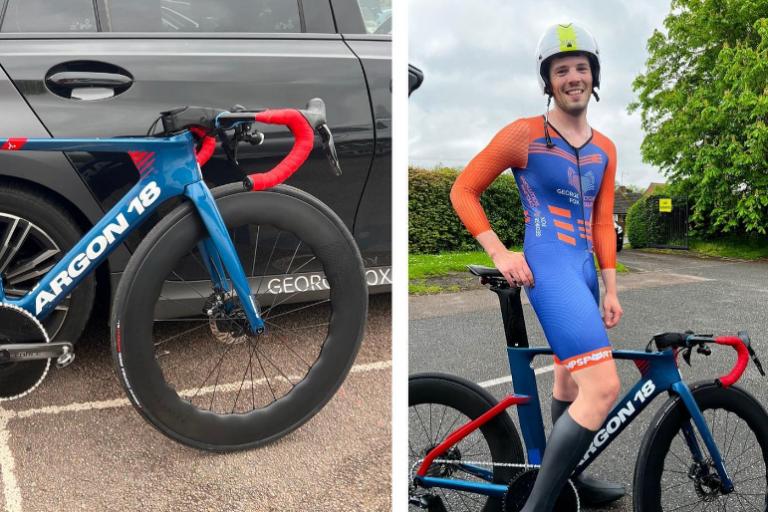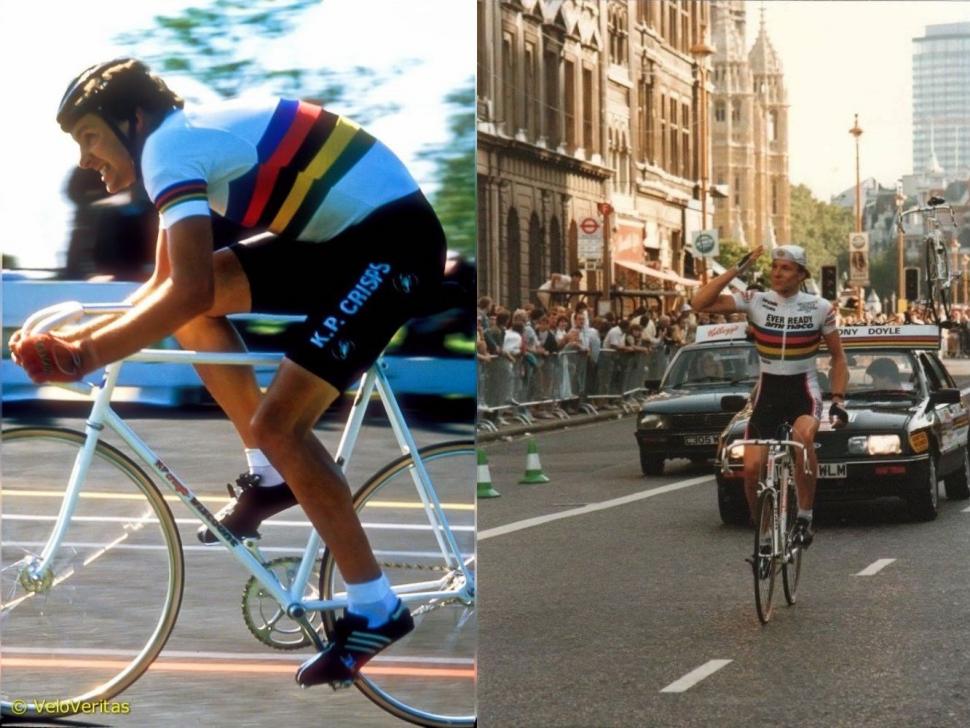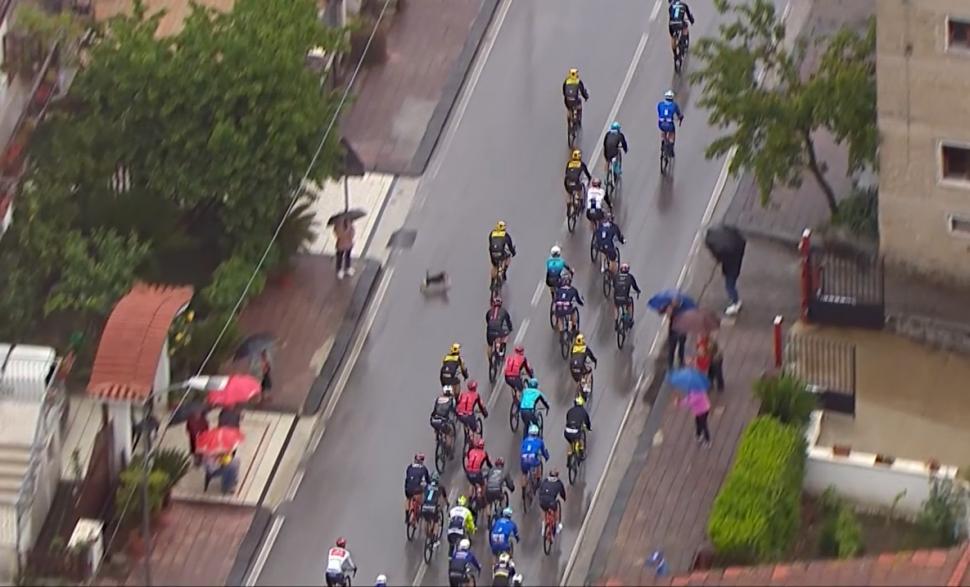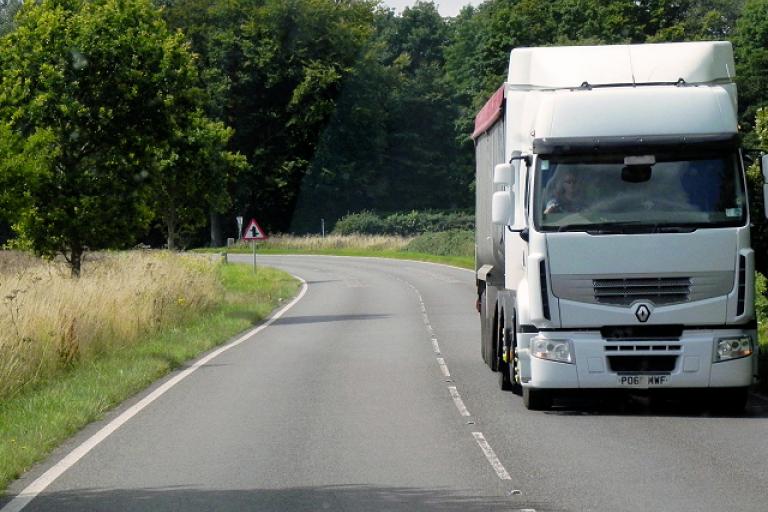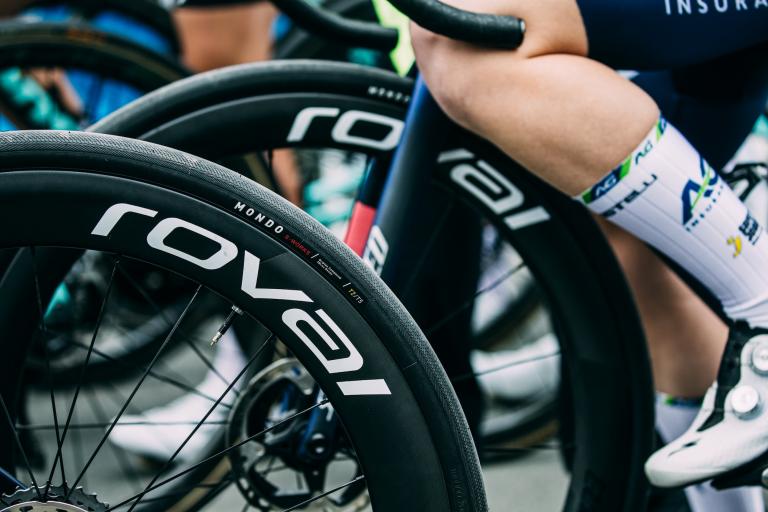- News
- Reviews
- Bikes
- Accessories
- Accessories - misc
- Computer mounts
- Bags
- Bar ends
- Bike bags & cases
- Bottle cages
- Bottles
- Cameras
- Car racks
- Child seats
- Computers
- Glasses
- GPS units
- Helmets
- Lights - front
- Lights - rear
- Lights - sets
- Locks
- Mirrors
- Mudguards
- Racks
- Pumps & CO2 inflators
- Puncture kits
- Reflectives
- Smart watches
- Stands and racks
- Trailers
- Clothing
- Components
- Bar tape & grips
- Bottom brackets
- Brake & gear cables
- Brake & STI levers
- Brake pads & spares
- Brakes
- Cassettes & freewheels
- Chains
- Chainsets & chainrings
- Derailleurs - front
- Derailleurs - rear
- Forks
- Gear levers & shifters
- Groupsets
- Handlebars & extensions
- Headsets
- Hubs
- Inner tubes
- Pedals
- Quick releases & skewers
- Saddles
- Seatposts
- Stems
- Wheels
- Tyres
- Health, fitness and nutrition
- Tools and workshop
- Miscellaneous
- Tubeless valves
- Buyers Guides
- Features
- Forum
- Recommends
- Podcast
news
Mark Cavendish slides across the finish line after Giro sprint crash chaos; Driver crashes into "cursed" Velorution bike shop AGAIN; Mr Loophole says plan to allow longer lorries "a really bad idea"; Genius congestion-tackling + more on the live blog
SUMMARY
No Live Blog item found.
 Cavendish crashes but slides across finish line at Giro d'Italia stage 5 (GCN)
Cavendish crashes but slides across finish line at Giro d'Italia stage 5 (GCN)10 May 2023, 17:02
Sliding across the finish line?! Cavendish holds on to handlebars to finish fifth while sliding on the ground
We all love a photo finish, but not sure this is what comes to my mind when I think of one.
#Giro #GirodItalia pic.twitter.com/FPVwoHeOGw
— Giro d'Italia (@giroditalia) May 10, 2023
While Groves held off stage two winner Jonathan Milan and 2019 Road World Champion Mads Pederson, Mark Cavendish grabbed everyone's attention with an acrobatic finish at the line that put him fifth.
I hope he's okay and gets a chance to actually complete one of his trademark sprints at any of the upcoming stages, but I can't deny, this is an instant classic.
10 May 2023, 16:59
10 May 2023, 15:48
Chaos! Rain-soaked Giro d'Italia stage five marred by crashes as Evenepoel, Cavendish, Roglič, Leknessund, Groves, all go down
I hate to ask it, but did I just jinx Mark Cavendish? I hope not.
As the heavens opened up in southern Italy, the Giro d'Italia stage five witnessed a number of crashes, with Evenepoel going down twice and Cavendish taking a really awkward tumble right before the finish line during the sprint.
Earlier in the day, Evenepoel got caught out by a crash caused by a loose dog. After sitting down on the ground for quite a bit, he managed to get up and get going. However, that was not to be the end of miseries for the world champion, who had passed on the race lead to Team DSM's Leknessund yesterday.
> Remco Evenepoel crashes after loose dog runs into Giro d'Italia peloton
With just 2km to go in the race, he got involved in another crash after entangling with a Trek-Segafredo rider. Although he didn't suffer any time loss in the general classification, it's definitely a day he would like to forget. Remco and Soudal Quick-Step can only hope the the Belgian is alright after today and can dust off this stage's setbacks and go again tomorrow.
Watch now the last km of stage 5 of the Giro d'Italia 2023🔻
.
Guarda ora l'ultimo km della tappa 5 del Giro d'Italia 2023.🔻#Giro #GirodItalia @Expo2030Roma pic.twitter.com/1mXRoduimI— Giro d'Italia (@giroditalia) May 10, 2023
Mark Cavendish was also affected a few kilometres later, first clipping Team DSM's Alberto Dainese's rear wheel but somehow avoided falling, but in doing so, drifted to his right and into Filippo Fiorelli, who got pinned at the barriers. Cavendish then bounced again to his left, and this time had no way of saving himself going down, sliding on the ground up to the finish line.
Another GC contender Jumbo Visma's Primož Roglič was also involved in a crash with 5km to go, with maglia rosa Leknessund also going down at the same time. Both were able to recover and not lose any time.
Amidst all this, I almost forgot that the 24-year-old Australian Kaden Groves took the stage victory. And guess what, the Alpecin-Deceuninck rider, who got mixed in a crash controversy in stage three of Giro, was caught up in the second Evenepoel crash himself as well! Ridiculously impressive stuff to get back up and go on to win the sprint!
Well that was some finish to today's stage. Hope everyone gets back on the team bus okay and good to race tomorrow.
10 May 2023, 14:46
It's pouring down at Giro d'Italia
It's been a tough day for the riders, with rainy and windy conditions making it seem less and less likely for a straightforward sprint finish at Salermo.
🔥 With 60 km to go @ChampionThomas8 - @TeamCOFIDIS, @ZOCC2 - @Bardiani_CSF, Stefano Gandin - @corratecSelleIt have a 1'02'' lead#Giro #GirodItalia pic.twitter.com/5kx5fz1udT
— Giro d'Italia (@giroditalia) May 10, 2023
But if you can count on anyone to show up, it's the Tifosi.
😍 Tifosi #Giro #GirodItalia pic.twitter.com/l1FD0XANkK
— Giro d'Italia (@giroditalia) May 10, 2023
Think Mark Cavendish's feeling at home with these conditions.
"Smilin' in the Rain"
🌧️🌧️🌧️#Giro #GirodItalia pic.twitter.com/YtJA7r2TzO
— Giro d'Italia (@giroditalia) May 10, 2023
10 May 2023, 14:19
Increased sentence for hit-and-run driver who killed cyclist while speeding at 80mph in 30mph zone before torching car
Lee Beevers was already banned from driving when he hit and killed cyclist Alan Tankard as the rider crossed the road on his bike wearing hi-vis clothing in West Yorkshire last year
10 May 2023, 13:38
Obituary: Tony Doyle, MBE, Britain's pioneering cycling World Track Champion
A cycling legend and one of the most successful Britons to take up the sport, Anthony 'Tony' Doyle MBE died from pancreatic cancer, at the age of 64, only four weeks after his diagnosis on 30 April, 2023.
road.cc has an obituary for the beloved icon, courtesy of the Doyle family:
Tony’s illustrious racing career brought unmatched success to British track cycling in the 1980s-90s - twice World Pursuit Champion, four-time European Champion, pioneering British winner of 23 Six Days and many other titles. Competing in the days before cycling had wide media exposure, Tony Doyle is a legend in the cycling community.
Tony’s cycling journey started in 1972 at age 14, when he joined his local Clarence Wheelers cycling club. In 1979, he moved to Metz, France, and spent a season racing on the continent. Shortly after his arrival, Tony won his first race, the 130km Prix Pinchi at Bouligny, going on to win a further 11 races in his first exposure to continental racing.
In 1980, he claimed his position as Britain’s leading track cyclist by winning the 5km Individual Pursuit in the 1980 World Championships at Besancon and, extraordinarily for a rookie professional, his first World Championship.
We’re deeply saddened to learn of the passing of former British Cycling President and world track champion, Tony Doyle MBE.
Our thoughts are with Tony’s family and many friends at this time. Full obituary to follow.
— British Cycling (@BritishCycling) May 5, 2023
Tony used his World Championship as a springboard to participate in his first professional Six Day, the Skol 6 in Wembley, describing it as a baptism of fire. Tony’s ambition was to become the first Briton to crack the continental Six Day circuit – a very few had won individual races, but nobody had yet mastered the Six Day, still less dominated the events as Tony was destined to do. He won his first Six Day in 1983 at Berlin, the first time a Brit had won a Six Day since 1972.
In the 1988-89 season, Doyle, with his teammate Danny Clark won five of the seven Six Days. Ultimately, Tony remains the most successful British Six Day competitor ever.
In the 1986 Championships, Tony was up against his long-standing rival Hans Henrik Oersted, who had beaten him in the previous two years’ finals. By the 4km mark, with 1km to go, Oersted had a lead of two seconds, and it seemed like the race was over. However, Tony put in one of the sport’s greatest ever counter-attacks and completed the final kilometre in just 1 minute 5.91 seconds. Oersted could not respond, and Tony Doyle had become World Champion once again, winning by a margin of 1.946 seconds.
The whole of British Cycling was jubilant, at a time when there wasn’t much success to cheer on the track.
Tony Doyle at the 1986 world individual pursuit championship’s, Colorado Springs. pic.twitter.com/r8C78WF81Q
— cycling archives (@mission753) May 8, 2023
In November 1989, Tony suffered a traumatic injury whilst racing at the Munich Six Day. He fell head-first and remained in a coma for eight days, with his shoulder broken in five places and his elbow broken in two. It was predicted that he would be unable ever to return to professional racing. He had to relearn the most basic tasks, including how to walk and eat.
However, within just three and a half months, he was back on the road and went on to win the 1990 Munich Six Day. He raced for a further four years, eventually retiring due to a back injury sustained at the Zurich Six Day in 1994.
Awarded an MBE in 1989 for services to cycling, Tony mentored and supported many younger riders, and visited countless schools to encourage the children into cycling as a pastime and competitively. He was a technical innovator, being the first to use for example the solid wheel, the wind tunnel, and the application of continuous meticulous tiny improvements to all aspects of equipment and training to improve performance.
After retiring, Tony later served as president of British Cycling, was the founding director of the Tour of Britain and played a significant role in sports promotion and media.
Anthony is survived by his partner Adriana Alessi, his children George, Gemma and James and their mother Anne.
10 May 2023, 12:41
Genius solution for getting rid of traffic congestion
A few brilliant, nuanced and data-backed solutions have been proposed in the Facebook group "Brighton and Hove against ULEZ and LTNs".
These include:
- Free-flowing traffic
- Higher speed limit
- Convenient free car parking space
- No pedestrian crossings or traffic lights
- Cycle lanes away from roads
- 30-60 mile trips
I think we've finally found the solution to all of the traffic congestion in every single city.
In this case it's Brighton & Hove specific, but I can't see any reason what so ever, why it wouldn't work everywhere. Can you? pic.twitter.com/ynI04zhETm
— Adam Bronkhorst (@AdamBronkhorst) May 10, 2023
10 May 2023, 12:20
Remco Evenepoel crashes after loose dog runs into Giro d'Italia peloton
I had just switched on the Giro when this happened...
A massive heart-in-mouth moment for Remco Evenepoel and Soudal Quick-Step, as an awfully cute dog unfortunately made its way onto the track, forcing one of the world champion's teammates to hit the deck first which led to Evenepoel crashing as well.
> Remco Evenepoel crashes after loose dog runs into Giro d'Italia peloton
10 May 2023, 11:45
The end is nigh: Mr Loophole defends cyclists, calls allowing longer lorries on UK roads "a really bad idea"
He is back with his armchair expert analysis of road safety in Great Britain, and this time he said... wait, I wasn't suppposed to agree with him.
When Nick Freeman, the man known as Mr Loophole for securing acquittals for celebrity clients charged with motoring offences (Beckham, Lampard, and Clarkson), tweeted about the UK Government's decision to allow "longer and more hazardous" lorries on roads putting cyclists' and pedestrians' lives in danger, I thought I was getting duped by one of those fake parody accounts.
But I couldn't help but agree with everything Loophole's said, and that's making me feel a bit uneasy.
A really bad idea. Poses huge additional risk to pedestrians, cyclists, and cars. Particularly on slow moving, narrow lanes of smart motorways. Will be heavier carbon footprint and end up with many more large lorries on roads. Why not put haulage on rail?https://t.co/wijsII3Ozx
— Nick Freeman (@TheMrLoophole) May 10, 2023
Additional risk to other road users? 100 per cent. Slow moving and adding to congestion? Definitely. More large lorries so heavier carbon footprint? Spot on. Why not use freight trains instead? Hallelujah!
But now that I think (with my tinfoil hat on), could this mean a change in direction for Freeman who's trying to get rid of bad blood between himself and cyclists? In January this year, he shocked everyone at road.cc by suggesting motorists make it their New Year's resolution to give cyclists more space when overtaking.
I'll still hold out judgement, because in the past, he's made comments claiming that cyclists are "abusing" rules on riding two abreast, ranted about "cycling with impunity" and applauded police action against "vigilante cyclists" filming law-breaking drivers.
10 May 2023, 10:59
Is Velorution cursed? Driver crashes into unfortunate London cycle shop once again
First a bus, now a car smashing into a bike shop? I can't believe it.
In what can only be described as a remarkable concurrence of events, a car driver has crashed into the London bike shop Velorution in Marylebone. It comes just six weeks after a separate incident in which a TfL bus crashed into another Velorution shop in Chelsea.
> Rudie Can’t Steer? TfL double-decker bus crashes into London bike shop with driver injured
Are we being targeted?! First, we had a bus come through our window at Chelsea and this morning, a car has parked in our Marylebone shop! The store will be closed until at least midday today.#carcrash #cycling #londonparking #ebike #londonnews pic.twitter.com/QoaYVX3qHq
— Velorution (@_velorution) May 10, 2023
It's unclear why the driver of the car crashed into the shop after turning right onto Riding House Street shortly after 6 am this morning. Video footage from inside the shop shows the driver taking the turn normally, before speeding up and becoming lodged in the scaffolding of the building. Riding House Street remains closed whilst the scaffolding of the building is assessed for damage.
Jonathan Cole, the owner of Velorution joked, "I'm starting to think one of our competitors is to blame!".
The shop is managed by Sean Hayhow, who was also in the Chelsea store at the time of that incident. "I'm starting to think I’m cursed," quipped Sean over WhatsApp this morning.
Cole continued, "On a serious note, I’m glad the shop was closed and no one was in it at the time of the event. We’re assisting emergency services and property management with their enquiries.
"It’s obviously extremely disappointing to have to close, at least for this morning. We’re entering our busiest time of the year and our unique cafe trike outside the shop does excellent business throughout the day. We’re doing everything we can to be open as soon as possible."
Velorution is a specialist in urban, folding and electric bikes, and has four stores in London. Two down, two to go?
10 May 2023, 10:12
It's the silly rebrand season! Team DSM to be rebranded as DSM-Firmenich by Tour de France
While we await summer to come knocking on our doors, I can get behind the silly rebrand season.
Days after we reported that Trek-Segafredo is to become Lidl-Trek from the Tour de France onwards, we are hearing that Team DSM are also set for a new persona just in time for the Grand Tour.
The Dutch team, whose 23-year-old rider Andreas Leknessund made headlines yesterday taking the pink jersey away from Evenepoel at the Giro d'Italia, has had its title sponsor DSM merge with the Swiss company Firmenich and could be renamed as "Team DSM-Firmenich" by mid-June, according to Radio Cycling.
A quick Wikipedia search told me that Firmenich SA is a private Swiss company in the fragrance and flavour business (come on, I'm not going to act like I knew that).
While not as exciting as having my second-favourite grocery store sponsor a UCI team personally, I'm all ready and eager to see how the new jerseys look. Wonder if Firmenich can pour money into making a kit that's still fragrant after my two hours on the bike.
10 May 2023, 09:47
10 May 2023, 09:35
Cycling infrastructure genius
A bike parking? Prop for the next Danny MacAskill video? Portal to another dimension (hopefully, with better cycling infrastructure)? I can't decide...
"Councillor, with this high quality cycling network you are really spoiling us." https://t.co/eg2iw0slgV
— Jon Owen (@anotherJon) May 9, 2023
I think this was my favourite reply
It’s fine- if you cycle fast enough at the fence you end up on platform 9 3/4
— Kate Ball (@tandemkate) May 9, 2023
10 May 2023, 08:26
Longer lorries allowed on UK's roads by the Government: Will it make cycling and walking conditions worse?
The UK Government has announced new laws today to permit longer semi-trailer combinations up to 18.55 metres on British roads – 2.05 metres longer than standard size.
Let's unpack this. First, I'll leave you all to discuss this bizarre press release.
Second, the “trial” for these longer lorries has been running since 2013 with over 3000 already on the road from 300 companies.
And third, freight trains exist! Campaign for Better Transport have in the past called them "an efficient, safe and clean alternative, with just one freight train capable of removing up to 129 lorries from our roads".
We did a lot of work exposing the dangers and misinformation around longer lorries, so we’re disappointed @transportgovuk is taking this retrograde step. https://t.co/WVGXcDhTHP
— Campaign for Better Transport (@CBTransport) May 10, 2023
Official figures show that HGVs accounted for only 3.4 per cent of traffic - but were involved in 15.5 per cent of cyclist and 11 per cent of pedestrian deaths.
As you'd expect, this decision has left many, including those who value their safety on roads scratching their heads.
Cycling UK has raised fears it "could cost lives of pedestrians and cyclists", and rightly pointed out: "At a time when funding for infrastructure to keep people cycling and walking safer has been cut, it's alarming that longer and more hazardous lorries could now be allowed to share the road with people cycling and walking."
You might remember this tweet from a Swedish researcher who did a test on the safety of cyclists when being passed by extra-long lorries and HGVs from a couple weeks ago.
Last weekend we collected data on how 23 experienced road cyclists feel when being passed by a truck. We tested 50 and 80 km/h and 1 m, 1.5 m and 2 m clearance with a standard and an extra long truck. Many thanks to all volunteers and the team! pic.twitter.com/bufzhvKvm4
— Katja Kircher 🚴♀️ - @katjakircher [at] mastodon.nu (@KatjaKircher) April 27, 2023
What do you think? Could it make cycling and walking on UK roads even more unsafe than it already is?
Here's what some other people think...
“Could”?
It’s a “will” - the uncertainty is around how many— Roger Humphry (@RojH123) May 10, 2023
Hot tip: it won’t save any CO2. Numbers of such lorries will increase, wiping out any gains. Same seen with rise of SUVs. We need heavy restrictions on use of all roads by motor traffic.
— Carlton Reid (@carltonreid) May 10, 2023
Just a ridiculous, retrograde step. Apparently it's about the 'need for robust supply chains', which reading between the lines = 'since we your govt have shot the UK trade in both feet with #Brexit, we're grasping for anything whatever the implications, safety or other...'
— ClayDenizen (@claydenizen) May 10, 2023
We'll be reporting more on this news shortly...
10 May 2023, 08:26
10 May 2023, 08:13
Council says it will conduct a further audit for World Championship route's pothole-repaired roads which left cyclist with a broken saddle
Yesterday morning, Alan Myles, perhaps inspired by the now moustache-toting Wout van Aert, set off to do a recon of the UCI World Championship route in Scotland.
But as it turned out, riding at race speeds may not be advisable on a (checks notes) race route, as the bumpy and even Campsie Road in Lennoxtown near Glasgow, which has been confirmed to feature in the Championships later this August, left him with a snapped rail on the saddle and hoping to dear God that the other rail holds on for the 16 miles till home.
@EDCouncil has made what is likely to be the last repair to part of the @CyclingWorlds route. I though i'd ride it at race speed this morning and my saddle snapped. So that will be fun for all the riders... just the 16 miles left for the other rail to hold on till home.@roadcc pic.twitter.com/848ZzubTIN
— Alan Myles 🇵🇸 (@AlanMyles8) May 9, 2023
He told road.cc: "The council re-laid the road just round the corner so it looks highly unlikely this bit will get done before the championships as they would have done it at the same time (the road had to be closed for it)."
We had reached out to the East Dunbartonshire Council asking whether they would be resurfacing the road or not, and their reply is... vague.
Ann Davie, Depute Chief Executive, East Dunbartonshire Council told road.cc: "We have conducted an initial route audit and are in regular discussion with the UCI World Cycling Championship event organisers. A further route audit will be conducted imminently. The results of this will be discussed with the organisers and actions and timescales will be agreed.”
I doubt the UCI will be very pleased.
10 May 2023, 08:06
Extremely close call for Jay Vine at Giro d'Italia after almost getting taken out by his own team car
It could have all gone wrong for UAE Team Emirates and Jay Vine at the stage four of Giro d'Italia.
Jay Vine. So close... 🧐#Giro #GirodItalia pic.twitter.com/BPlqgIkhfH
— Jakub Jarosz (@jakjarosz) May 9, 2023
"Well, that nearly ended in tears! That will have woken him up if nothing had before," said the commentator.
Watching this again today morning surely did wake me up (either that, or this second cup of coffee next to me).
Adwitiya joined road.cc in 2023 as a news writer after graduating with a masters in journalism from Cardiff University. His dissertation focused on active travel, which soon threw him into the deep end of covering everything related to the two-wheeled tool, and now cycling is as big a part of his life as guitars and football. He has previously covered local and national politics for Voice Wales, and also likes to writes about science, tech and the environment, if he can find the time. Living right next to the Taff trail in the Welsh capital, you can find him trying to tackle the brutal climbs in the valleys.
Add new comment
57 comments



I wasn't aware any railfreight strikes had been happening, Network rail signallers would have had an impact on them but I thought they'd been resolved, other than that the strikes have been with the passenger train co's.
Frankly certainly for a port like Felixstowe the A14 is more a risk than the railway, which is why the majority of container traffic is by rail, and thank god for it as else roads in Suffolk would be nose to tail container lorries.


SimoninSpalding
|
1 year ago
2 likes
The Swedish research is not relevant here. Their "Extra long" trucks are so called B-doubles which are permitted on some routes in Scandinavia (and I think Netherlands) which run at about 60 T gross and consist of a tractor unit pulling 2 trailers (think very short Aussie roadtrain).
The vehicles in the announcement are already here, and to be quite honest it makes no difference how long they are when they are passing you at 50mph, it is the bow wave and the wake that knock you about.
Edit: I have checked and the cycling utopia that is the Netherlands permits vehicles up to 25.25m and 60 tonnes.

Matthew Acton-Varian
|
1 year ago
4 likes
Not only is the decision to allow longer lorries onto UK roads dangerous for us, our infrastructure in a number of places will not be able to cope.
The amount of narrow passings and entrances to industrial estates mean our current articulated vehicles barely make it through, and often cause temporary road blockages as they negotiate these pinch points. And these aren't inner city areas, either. I wonder how many walls/buildings/gates will be damaged by these longer lorries who get stuck in these tight spaces.
The reporting on this (as often with cycling stuff in the mainstream media) is quite poor.
Firstly these longer semi-trailer vehicles have been on the road as part of "a trial" for a decade.
Secondly this overal length of vehicle is already permitted for rigid HGV plus trailer combinations.
Thirdly, in order to be accepted for the trial, and presumably now the regulations are to be changed permanently, the combination has to be able to manoeuvre in the same restricted space as a "standard" 13.8m trailer, so they all have active steering axles.
All the evidence is that these are no more dangerous than standard HGVs.
Having said that, they are not well suited to urban environments, but the operators know this and have a range of trailer designs for the different routes they operate on.



They are significantly more expensive due to the control systems for the steering. Any haulier moving things that are already weight limited will not want them because the trailers are heavier so they would actually lose payload.
As with double decker trailers,, 1 axle trailers, 2 axle trailers, rigid HGVs hauliers will use them where they make commercial sense. Most of the hauliers I work with are involved in agricultural bulk commodities and they have no interest in this at all.
Not only is the decision to allow longer lorries onto UK roads dangerous for us, our infrastructure in a number of places will not be able to cope.
The amount of narrow passings and entrances to industrial estates mean our current articulated vehicles barely make it through, and often cause temporary road blockages as they negotiate these pinch points. And these aren't inner city areas, either. I wonder how many walls/buildings/gates will be damaged by these longer lorries who get stuck in these tight spaces.
The road surfaces will suffer if the long lorries are heavier too. It'd make more sense to split the lorries up into lighter loads to avoid destroying the tarmac.
Not from a carbon footprint perspective. Over the trial period most hauliers using the longer trailers have seen a small increase in fuel consumption, more than offset by the extra goods carried.
I agree that our roads are crumbling under current traffic, but that isn't the fault of hauliers or lorries - as with our cycling concerns it caused by a failure to invest adequately in infrastructure.
Not from a carbon footprint perspective. Over the trial period most hauliers using the longer trailers have seen a small increase in fuel consumption, more than offset by the extra goods carried.
I agree that our roads are crumbling under current traffic, but that isn't the fault of hauliers or lorries - as with our cycling concerns it caused by a failure to invest adequately in infrastructure.
The damage is disproportionately caused by the heavy lorries, so we are in effect subsidising the bigger vehicles.

NickSprink
|
1 year ago
4 likes
HGVs spend most their time with at least some free space, often lots. Very rarely are they full to the point that an extra 2m would make a difference. The deciding factors on what goes on a lorry are what needs to go where and when, not the available capacity of the lorry itself.
I therefore struggle with the economic value attributed to this. Just more space on our roads being taken up with bigger vehicles causing more collisions.

Are you a failed haulier?
The way that hauliers make a profit is by running full most of the time, whether that be at max gross weight or maximum volume.
There will be empty space where a haulier is doing multi point drop/ collections, but these longer trailers are not for that. These are for trunking between distibution centres.





I know there is no extra weight. I was commenting on Hirsute's comment regarding the desire to increase legal max weight. I just get fed up watching the road edges crumble where HGVs are using B roads which are not desighned to take their weight.
I work in distribution and we use these longer vehicles already. They are useful to reduce the number of trips from our central distribution hub. I have seen (only once in fairness in the several years we have used them) a driver swing around and take out a stack of products when he forgot about the extra length. We learned from that and put in extra training - hopefully everyone is as responsible!
Pages
Latest Comments
- chrisonabike 2 sec ago
Could it be that an industry * with vast wealth and long cultivated influence, which is now seen as providing something both practically and...
- chrisonabike 18 min 25 sec ago
Presumably a) expense b) for something that (mostly) works against your customers' convenience? And the usual "but emergencies - what about when...
- Aluminium can 17 min 59 sec ago
Is there any real world evidence that slightly reducing the weight of your crank arms actually makes your bike faster? Seems like a hell of lot of...
- David9694 1 hour 24 min ago
Remembrance event driving incident sees woman reported (paywall)...
- quiff 4 hours 44 min ago
I was going to suggest the Fairlight Strael too, and went to check if it came in on budget. While there, I finally ordered the frameset I've been...
- quiff 7 hours 39 min ago
"No darling, I said a cactus bike holder, not a bike cactus holder."...
- Andrewbanshee 9 hours 54 min ago
I have visited Guernsey and my wife goes there a few times a year for work. This act of premeditated violence shocks me. There are quite a lot of...
- hawkinspeter 10 hours 20 min ago
You could well be right. Personally, I think Avonvale Rd is just a disaster for having two way traffic. So many drivers think the traffic calming...
- hawkinspeter 10 hours 27 min ago
Although Muller Rd isn't great to cycle on (the north end, anyhow), it's certainly not the worst. I'm definitely in the "brave and bold cyclist" at...
